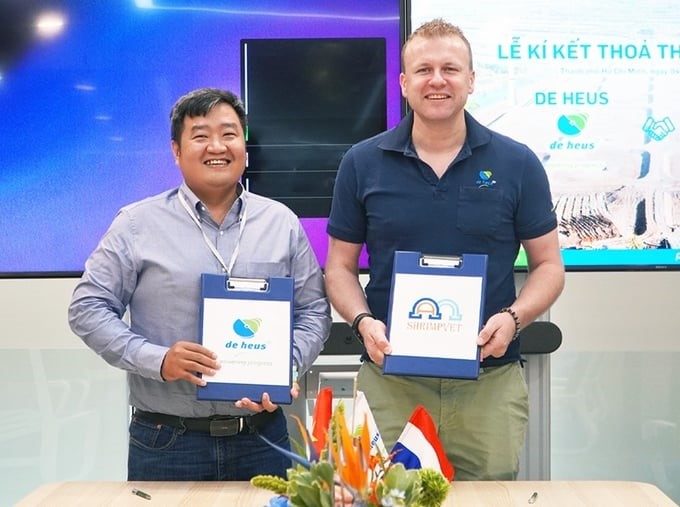November 26, 2025 | 01:14 GMT +7
November 26, 2025 | 01:14 GMT +7
Hotline: 0913.378.918
November 26, 2025 | 01:14 GMT +7
Hotline: 0913.378.918

Cooperation signing ceremony between De Heus Vietnam Group and ShrimpVet Company.
This cooperation once again emphasizes De Heus Vietnam's wish to become a reliable partner of livestock farmers and businesses in the livestock sector in Vietnam. At the same time, continue to affirm De Heus Group's strengths in providing high-quality feed, transferring knowledge, and supporting market access, thereby contributing to optimizing productivity.
De Heus Group also aims to contribute to building a sustainable shrimp farming industry, leaving a mark of Vietnam's shrimp industry on the international market.
To be more specific, De Heus Vietnam and ShrimpVet cooperate on strategic aspects such as experimental research on shrimp syndromes, organizing seminars and press conferences, etc.
In addition, De Heus Vietnam and ShrimpVet also combine to cooperate in researching and developing shrimp farming activities and developing a comprehensive process for shrimp seed farming. With this cooperation, De Heus Group hopes to contribute to enhancing the potential and development advantages of Vietnam's shrimp industry.
Cooperation between De Heus Vietnam and ShrimpVet promises to open a new step forward in shrimp farming, contributing to "De Heus Group – 15-year journey of elevating Vietnamese livestock farming.".
Translated by Thu Huyen
/2025/11/25/0045-1-135246_13.jpg)
(VAN) Ca Mau is researching a model of sea-encroaching embankments combined with viaducts and logistics service zones, aiming both to prevent erosion and create land funds for marine economic development.

(VAN) The information was shared at the seminar 'Urban Agriculture - Solutions for Developing Green Spaces,' organized by the Kinh te & Do thi Newspaper and the Biotechnology Center of Ho Chi Minh City.
/2025/11/19/4141-2-132831_216.jpg)
(VAN) One of Japfa's outstanding solutions is implementing digital transformation and artificial intelligence (AI) to optimize operations, enhance productivity, and advance sustainable development.
/2025/11/19/4847-1-093540_448.jpg)
(VAN) The Gia Lai Provincial People’s Committee had a working session with the delegation of the U.S. Department of Agriculture, the State of Idaho, and representatives of the State's leading enterprises.

(VAN) Ca Mau has a sufficient foundation to become a strong regional aquaculture center, where production integrates the economy, the environment, and the lives of the people.

(VAN) SEIKI Group envisions itself as a pioneer in the ‘dual transformation’ of digital technology and green industry, standing alongside the Government and Vietnamese businesses in their pursuit of sustainable development.

(VAN) The VNGEONET network affirms Viet Nam's progress in mastering digital space, providing a precise positioning data platform to serve socioeconomic development.